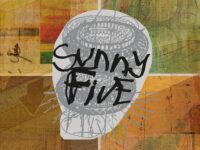Whenever there is jazz and improvisational music of the most audacious, daring and cutting-edge sort, percussion whiz Ches Smith can usually be found in the mix. He’s held down rhythm and electronic duties for Marc Ribot’s Ceramic Dog, Sun of Goldfinger (and its various spinoffs), Tim Berne’s Snakeoil and Mary Halvorson’s various bands, to name just a few eclectic ensembles. In recent years, Smith has been making a name for himself as a leader offering music that pushes the boundaries out in many ways even more aggressively than he has as a sideman. Smith took novel and fearless approaches to Path of Seven Colors (2021) and Interpret It Well (2022), earning him the accolades as a composer and leader that he’s long earned as a technician.
With this newly-earned reputation comes higher expectations, and his upcoming Laugh Ash (February 2 2024, Pyroclastic Records) lives up to it with another ambitious project that’s not a mere repeat of what he’s done before.
To carry out his big ideas, Smith needed a big line-up, in terms of both size and acumen. So, he recruited James Brandon Lewis (tenor sax), Nate Wooley (trumpet), Anna Webber (flute), Shahzad Ismaily (bass, keys), Oscar Noriega (clarinets), Shara Lunon (voice), Jennifer Choi (violin), Kyle Armbrust (viola) and Michael Nicolas (cello). Smith handles a lot on his own, playing various percussion instruments in addition to making electronic noises.
One can look at this array of instruments and wonder if Smith intended to make bop, hip-hop, experimental or chamber music. The answer is, yes. It’s unique enough already, but made even more so by how he puts it all together.
“Minimalism” is a jumbled mixture of chamber jazz, krautrock and spoken word lasting barely 150 seconds. But once your ears absorb the blast of genres that normally don’t get mashed together, you realize there’s a coherency to it. Like the album cover’s depiction of a flame burning from a pail, Smith feeds his bucket of songs with a potpourri of styles, approaches and arrangements that ignite when blended together.
Atari-era electro-bloops co-exist with string trio and programmed thumps for “Remote Convivial,” the melodic lead left to the woodwinds and trumpet as roles are carefully defined and carried out. Lunon’s poetic recital on “Sweatered Webs (Hey Mom)” goes along to the beat but isn’t quite rap; her provocative delivery turn the poetry that she wrote into sonic art. And then here comes Lewis with a sax obliterating the line between tonal and atonal.
“Shaken, Stirred Silence” actually plays out as titled, a stillness that gets disturbed by bass, strings, electronic noises and voice until the beast awakens and a hip-hop groove ensues, gathering density along the way. Smith’s vibes with that strings actually play in the pocket.
Experimental electronica is prominent on “The Most Fucked,” Lunon’s voice manipulated into an instrument of its own as Webber’s flute provides acoustic balance. Smith sticks with vibes for the all-acoustic the avant chamber piece “Winter Sprung.”
“Disco Inferred” manages to excel in carefully constructed composition alongside improvisation, acoustic alongside electronic, all at once. “Unyielding Daydream Welding” has an RnB flavor that tarts up the electro-acoustic jazz foundation, underscored by Lewis’ funky wails. Lastly, Smith deftly marries a serpentine figure to an odd meter at the apex of his modern classical piece “Exit Shivers”
It gets harder and harder to artfully stand out in music today, especially in the highly improvisational experimental/avant-garde world that Ches Smith has long made his musical home. Nonetheless, with highly original records like Laugh Ash, that’s becoming habitual for him.




